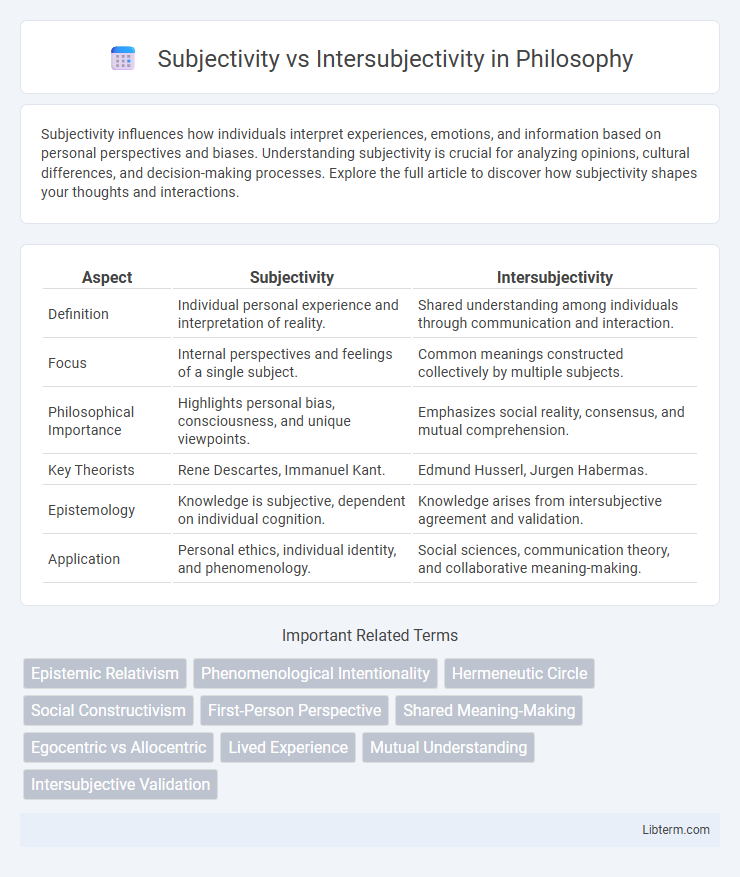Subjectivity influences how individuals interpret experiences, emotions, and information based on personal perspectives and biases. Understanding subjectivity is crucial for analyzing opinions, cultural differences, and decision-making processes. Explore the full article to discover how subjectivity shapes your thoughts and interactions.
Table of Comparison
| Aspect | Subjectivity | Intersubjectivity |
|---|---|---|
| Definition | Individual personal experience and interpretation of reality. | Shared understanding among individuals through communication and interaction. |
| Focus | Internal perspectives and feelings of a single subject. | Common meanings constructed collectively by multiple subjects. |
| Philosophical Importance | Highlights personal bias, consciousness, and unique viewpoints. | Emphasizes social reality, consensus, and mutual comprehension. |
| Key Theorists | Rene Descartes, Immanuel Kant. | Edmund Husserl, Jurgen Habermas. |
| Epistemology | Knowledge is subjective, dependent on individual cognition. | Knowledge arises from intersubjective agreement and validation. |
| Application | Personal ethics, individual identity, and phenomenology. | Social sciences, communication theory, and collaborative meaning-making. |
Defining Subjectivity: The Personal Lens
Subjectivity refers to an individual's unique perspective shaped by personal experiences, emotions, and biases, which influence how reality is perceived and interpreted. This personal lens creates diverse understandings of events, emphasizing the internal and private nature of human consciousness. Defining subjectivity involves recognizing the role of individual cognition and affect in constructing meaning distinct from shared or collective viewpoints.
Understanding Intersubjectivity: Shared Meanings
Intersubjectivity refers to the shared understanding and mutual construction of meanings between individuals within a social context. It contrasts with subjectivity, which centers on personal, individual perspectives and experiences. The process of achieving intersubjectivity relies on communication, empathy, and recognition of others' viewpoints to create common ground and collective meaning.
Historical Background: Origins of the Debate
The debate between subjectivity and intersubjectivity originated in early phenomenology, notably with Edmund Husserl's exploration of consciousness and the lifeworld in the early 20th century. Husserl emphasized the importance of intersubjectivity as a foundation for shared meaning, contrasting with earlier philosophical traditions that focused primarily on individual subjectivity. This discourse evolved through contributions from philosophers like Martin Heidegger and Maurice Merleau-Ponty, who expanded the understanding of how subjective experiences are intertwined with social and cultural contexts.
Philosophical Foundations: Key Theories Compared
Subjectivity centers on individual experiences and internal perspectives, grounded in phenomenology as seen in Husserl's emphasis on consciousness as the basis of meaning. Intersubjectivity, rooted in the works of Heidegger and Gadamer, highlights the shared, communal creation of meaning through dialogue and social interaction. Contemporary philosophy contrasts these by examining how subjective consciousness is mediated and co-constituted within intersubjective frameworks, influencing theories of knowledge, language, and social reality.
Subjectivity in Everyday Experience
Subjectivity in everyday experience reflects individual perceptions, emotions, and biases that shape how reality is interpreted on a personal level. This internal viewpoint influences decision-making, memory, and emotional responses, making each person's experience unique and non-transferable. Understanding subjectivity is crucial for analyzing personal narratives, psychological states, and the construction of meaning within daily life.
The Role of Communication in Intersubjectivity
Communication serves as the foundational mechanism through which intersubjectivity is established, enabling individuals to share, negotiate, and align their subjective experiences. Through verbal and non-verbal interactions, participants co-construct meanings that transcend individual subjectivity, fostering mutual understanding and collective reality. This dynamic exchange transforms isolated perspectives into interconnected knowledge frameworks essential for social coordination and collaboration.
Subjectivity vs Intersubjectivity in Psychology
Subjectivity in psychology refers to individual experiences, emotions, and personal perspectives that shape one's understanding of reality. Intersubjectivity contrasts by emphasizing shared meanings and mutual understanding constructed through social interaction and communication between individuals. The interplay between subjectivity and intersubjectivity is crucial for comprehending how personal consciousness integrates with collective cognition in psychological processes.
Implications for Knowledge and Truth
Subjectivity emphasizes individual perspectives shaping knowledge and truth, highlighting personal bias and interpretation in understanding reality. In contrast, intersubjectivity underscores shared meanings and consensus among multiple consciousnesses, providing a basis for more reliable and socially validated knowledge. This distinction influences epistemology by challenging objective claims and promoting dialogue as essential for establishing truth within communities.
Challenges and Critiques in the Discourse
Challenges in the discourse on subjectivity versus intersubjectivity often revolve around the difficulty of balancing individual perspectives with shared social meanings, leading to debates on the reliability of personal experiences as sources of knowledge. Critics argue that subjectivity risks relativism and solipsism, while intersubjectivity may overlook unique individual insights by emphasizing consensus and collective understanding. The tension between these concepts complicates epistemological frameworks, raising critical questions about how meaning and truth are constructed in social interactions.
Towards a Synthesis: Bridging Perspectives
Subjectivity emphasizes individual experiences and personal interpretation, while intersubjectivity highlights shared understanding and collective meaning-making. Bridging perspectives involves recognizing how subjective viewpoints contribute to constructing intersubjective realities through dialogue and mutual recognition. This synthesis fosters a deeper comprehension of knowledge as both personally experienced and communally validated.
Subjectivity Infographic

 libterm.com
libterm.com